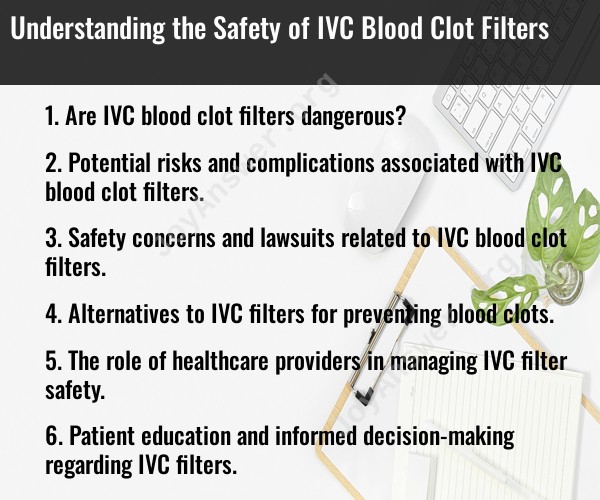Are IVC blood clot filters dangerous?
Inferior vena cava (IVC) filters are medical devices used to prevent blood clots from traveling to the lungs, a condition known as pulmonary embolism. These filters are typically implanted in patients at risk of developing blood clots, such as those who have deep vein thrombosis (DVT) or are undergoing surgery. While IVC filters can be effective in preventing pulmonary embolism, there have been concerns about their safety.
Some potential safety issues associated with IVC filters include:
Migration: There have been cases where IVC filters migrate, meaning they move from their original placement. When a filter migrates, it may not effectively catch blood clots, or it could become lodged in a different part of the body, potentially causing harm.
Perforation: IVC filters can sometimes perforate or puncture the walls of the vena cava, the large vein in the abdomen. This can lead to internal bleeding or other complications.
Device Fracture: In rare cases, IVC filters may break or fracture. Broken fragments can travel through the bloodstream and potentially damage other organs or vessels.
Thrombosis: Paradoxically, there have been reports of IVC filters causing thrombosis (blood clot formation) within the filter itself. This can obstruct blood flow and create additional health risks.
Long-Term Complications: The safety of leaving IVC filters in place for extended periods (beyond the recommended time) has been a concern, as these filters were initially designed for temporary use. Long-term placement may increase the risk of complications.
Retrieval Challenges: In some cases, retrieving IVC filters after they've been implanted can be difficult. This can result in a filter remaining in the patient longer than intended.
It's important to note that not all IVC filters or patients will experience these issues, and many patients benefit from the use of these devices in preventing pulmonary embolism. However, due to safety concerns and potential complications, healthcare providers and regulatory agencies, such as the U.S. Food and Drug Administration (FDA), have issued recommendations and guidelines for the use and monitoring of IVC filters. These recommendations may include selecting appropriate patients for filter placement, ensuring timely retrieval when no longer needed, and closely monitoring patients who have IVC filters in place.
If you are concerned about the safety of an IVC filter or have questions about its use in your specific case, it is important to consult with your healthcare provider. They can provide information about the benefits and risks of IVC filters and help you make informed decisions about your treatment. Additionally, if you experience any unusual symptoms or complications related to your IVC filter, seek medical attention promptly.
Potential risks and complications associated with IVC blood clot filters
IVC blood clot filters are medical devices that are implanted in the inferior vena cava (IVC), a large vein in the abdomen that carries blood from the lower body to the heart. The devices are designed to trap blood clots that may travel to the lungs, where they can cause a life-threatening condition called pulmonary embolism.
While IVC blood clot filters can be life-saving, they also pose a number of potential risks and complications, including:
- Filter migration: IVC blood clot filters can move from their original position in the IVC to other parts of the body, including the heart, lungs, and kidneys. This can cause serious damage to these organs and can even be fatal.
- Filter fracture: IVC blood clot filters can break or fracture over time. This can release fragments of the filter into the bloodstream, which can block blood vessels and lead to organ damage.
- Filter thrombosis: Blood clots can form on the IVC blood clot filter itself. This can block the filter and prevent it from working properly.
- Filter perforation: IVC blood clot filters can perforate the wall of the IVC, causing bleeding and other complications.
Safety concerns and lawsuits related to IVC blood clot filters
In recent years, there have been a number of safety concerns and lawsuits related to IVC blood clot filters. Some of the most well-known cases involve the Cook Celect and Bard Recovery filters.
In 2010, the FDA issued a safety communication warning about the risks of filter migration and fracture associated with the Cook Celect filter. In 2014, the company recalled the filter from the market.
In 2015, the FDA issued a safety communication warning about the risks of filter perforation and thrombosis associated with the Bard Recovery filter. In 2017, the company issued a recall of the filter.
Alternatives to IVC filters for preventing blood clots
There are a number of alternatives to IVC blood clot filters for preventing blood clots. These include:
- Anticoagulants: Anticoagulants, also known as blood thinners, are medications that help to prevent blood clots from forming.
- Compression stockings: Compression stockings are tight-fitting garments that help to improve blood flow in the legs.
- Elevation: Elevating the legs can help to reduce swelling and improve blood flow.
The role of healthcare providers in managing IVC filter safety
Healthcare providers play an important role in managing the safety of IVC blood clot filters. They should carefully consider the risks and benefits of IVC filters before implanting them in patients. They should also monitor patients closely for signs and symptoms of complications.
If a patient experiences any complications related to an IVC blood clot filter, the healthcare provider should remove the filter as soon as possible.
Patient education and informed decision-making regarding IVC filters
Patients should be fully informed about the risks and benefits of IVC blood clot filters before making the decision to have one implanted. Healthcare providers should discuss the alternatives to IVC filters and should answer any questions that patients have.
Patients should also be aware of the signs and symptoms of complications related to IVC blood clot filters. If they experience any of these symptoms, they should contact their healthcare provider immediately.
Conclusion
IVC blood clot filters can be life-saving devices, but they also pose a number of potential risks and complications. Patients should be fully informed about these risks and benefits before making the decision to have an IVC filter implanted. Healthcare providers also play an important role in managing the safety of IVC blood clot filters.












